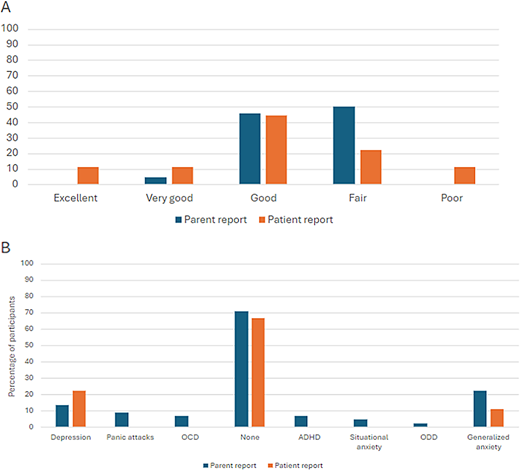Chronic granulomatous disease (CGD) is an inborn error of immunity caused by defects in NADPH oxidase, which causes phagocyte dysfunction. CGD is characterized by recurrent infections and autoimmunity. Allogeneic hematopoietic stem cell transplantation (HSCT) is a curative therapy. However, data regarding patient satisfaction with post-HSCT state of health and quality of life are lacking.
A Primary Immune Deficiency Treatment Consortium (PIDTC) working group designed online surveys to assess post-HSCT quality of life and satisfaction with transplantation. Surveys were distributed from November 2023 to March 2024 to all members of the CGD Association of America (CGDAA). Adults who personally underwent or parents of children who underwent HSCT for CGD were asked to participate. Two surveys were offered: one for participants who were 18 years or older and one for parents of patients.
Complete surveys representing 54 unique patients were included for analysis. Forty-four were from parents whose children were a median of 12 years old and a median of 6 years post-transplant. Nine were returned from patients who were a median of 30 years old and a median of 4 years post-transplant (Table 1).
Seventy-eight percent of patient and parent respondents reported that quality of life was better after transplant and 89% felt that the transplant improved their physical health (Figure 1).
(A) Do you feel quality of life is better now post-transplant than it was pre-transplant? (B) Do you feel that the transplant has been beneficial from a medical perspective?
(A) Do you feel quality of life is better now post-transplant than it was pre-transplant? (B) Do you feel that the transplant has been beneficial from a medical perspective?
PROMIS Global Health scoring tool revealed 84% of patients had mental health scores within 1 SE of the mean. Only a few mental health diagnoses were self-reported (Figure 2).
(A) PROMIS Mental Health Report Scores. (B) Mental health condition diagnosed by a physician.
(A) PROMIS Mental Health Report Scores. (B) Mental health condition diagnosed by a physician.
After transplant, there were no self-reported cases of autoimmune disease or malignancy. Three participants were able to conceive children. One respondent used sperm banking; two did not use fertility preservation or treatments.
Our data demonstrate that the majority of patients who undergo allogeneic HSCT for definitive treatment of CGD experience improvements in physical and/or mental health and enjoy an improved quality of life after transplant. Overall, this study supports positive outcomes for patients treated with allogeneic HSCT.








